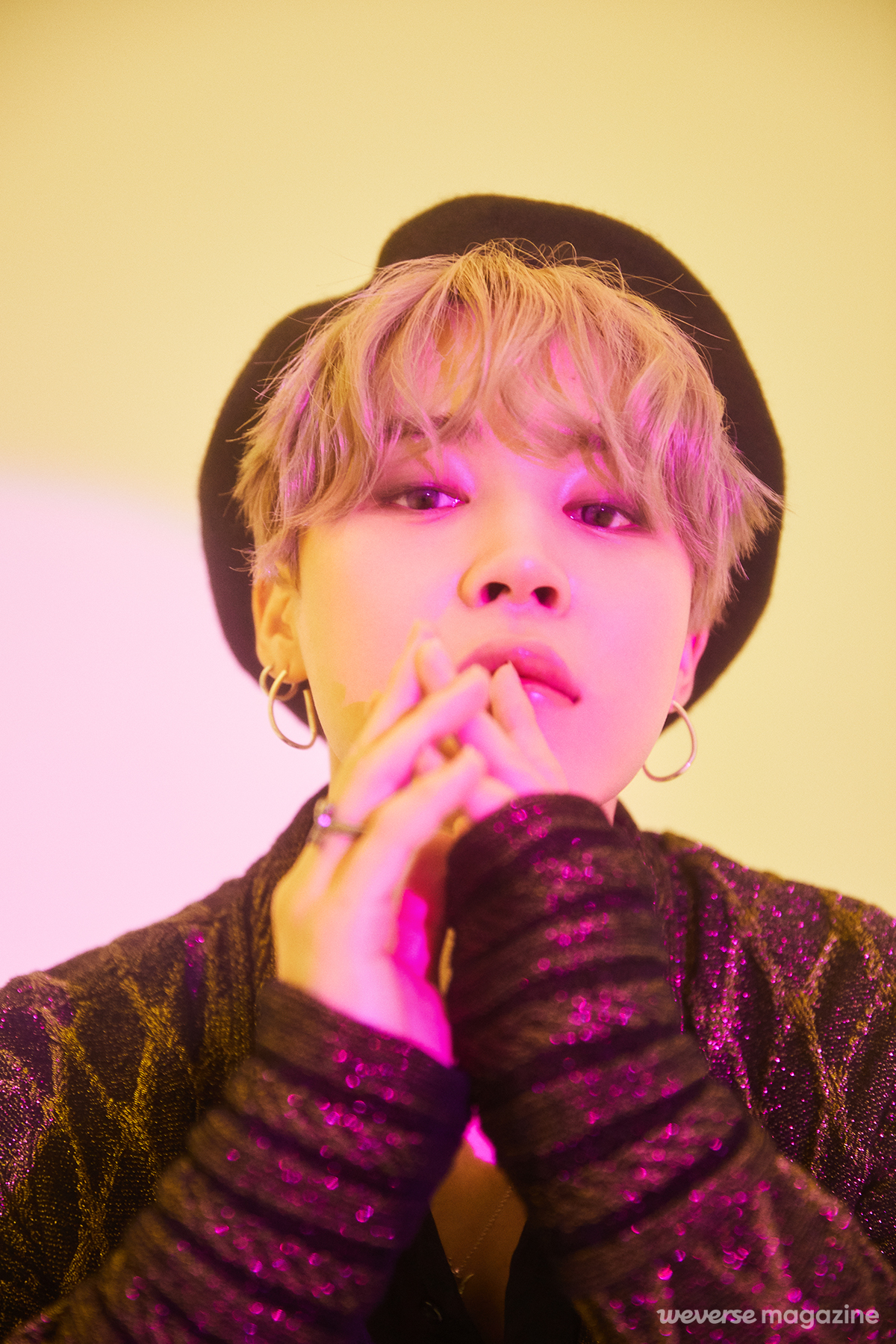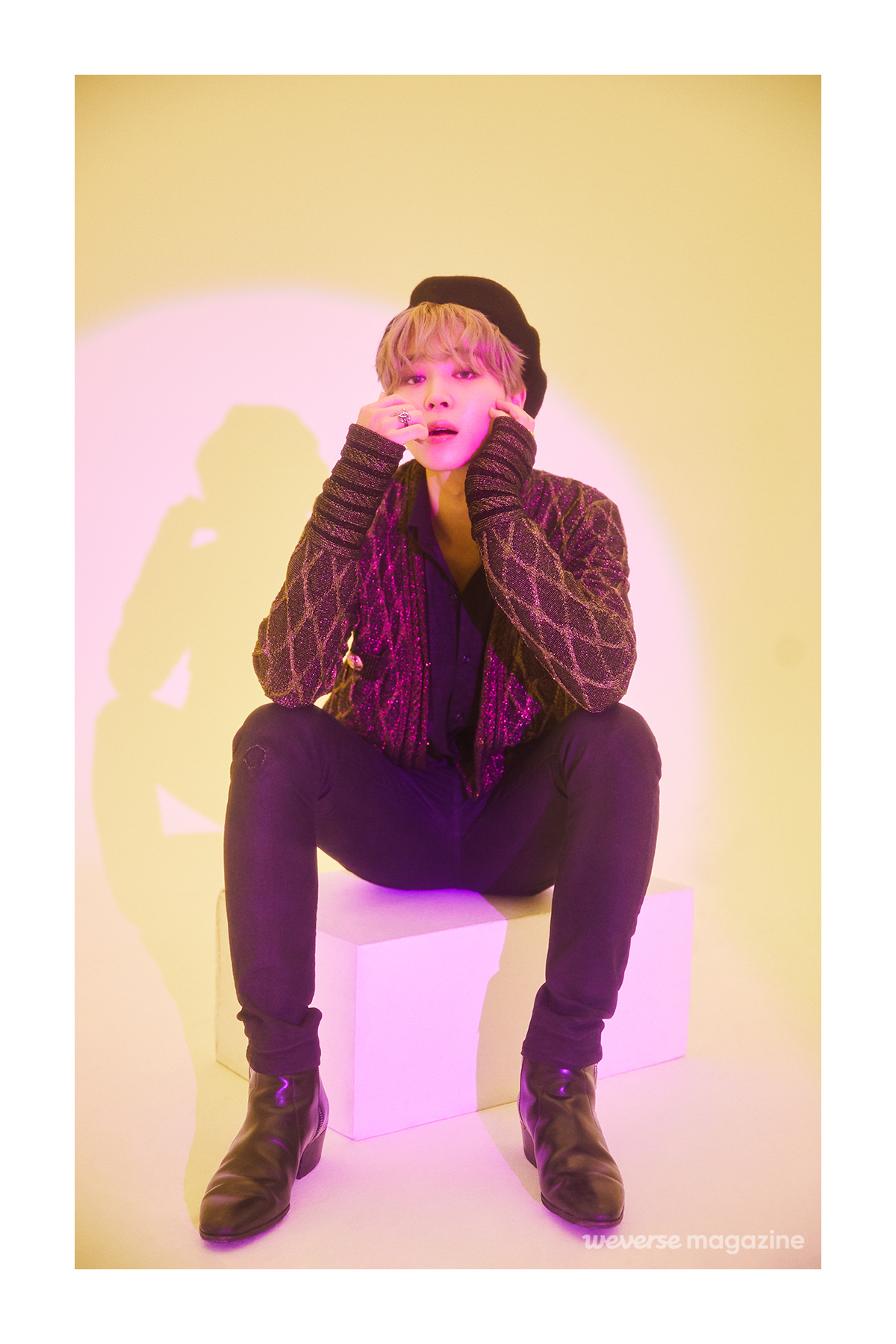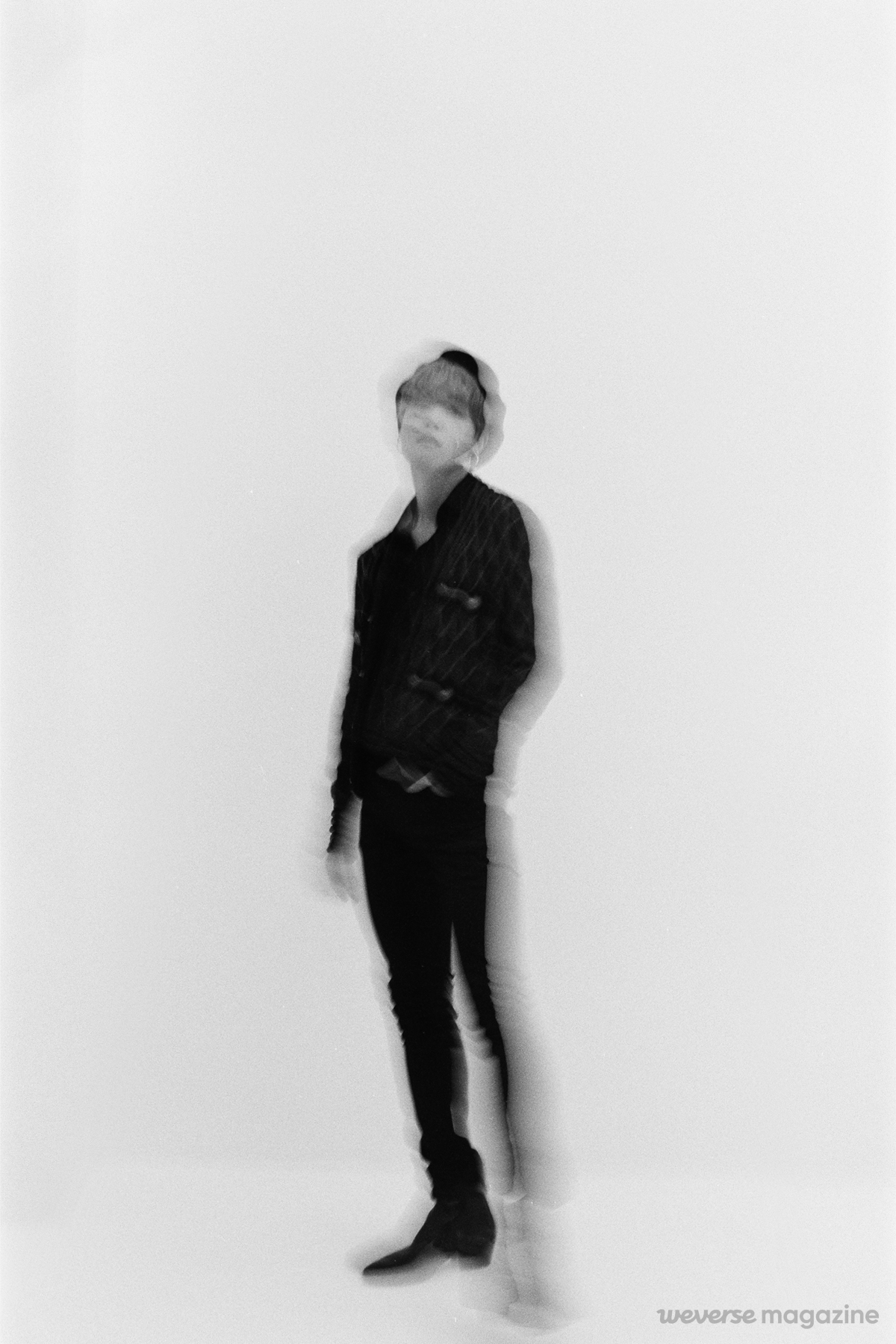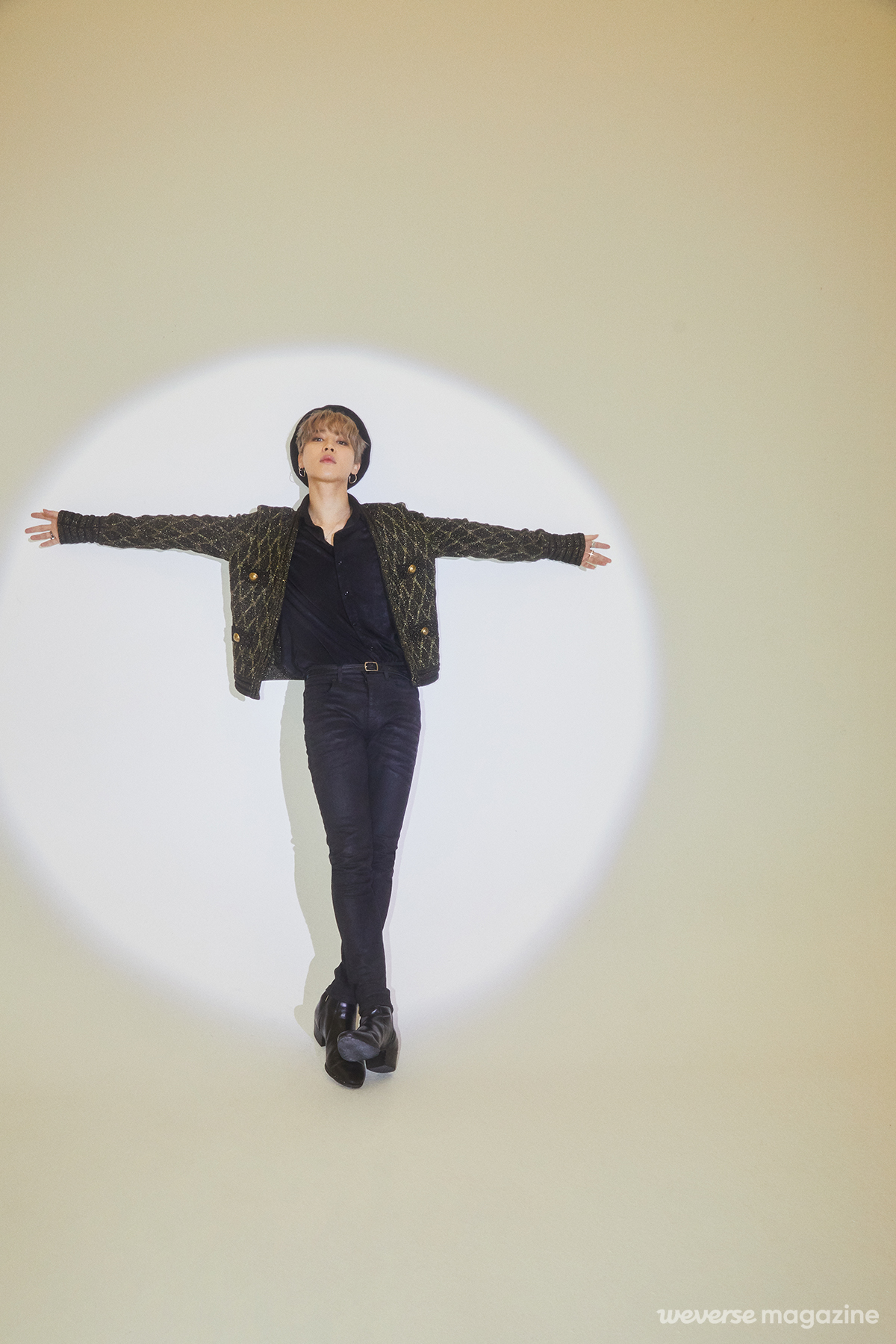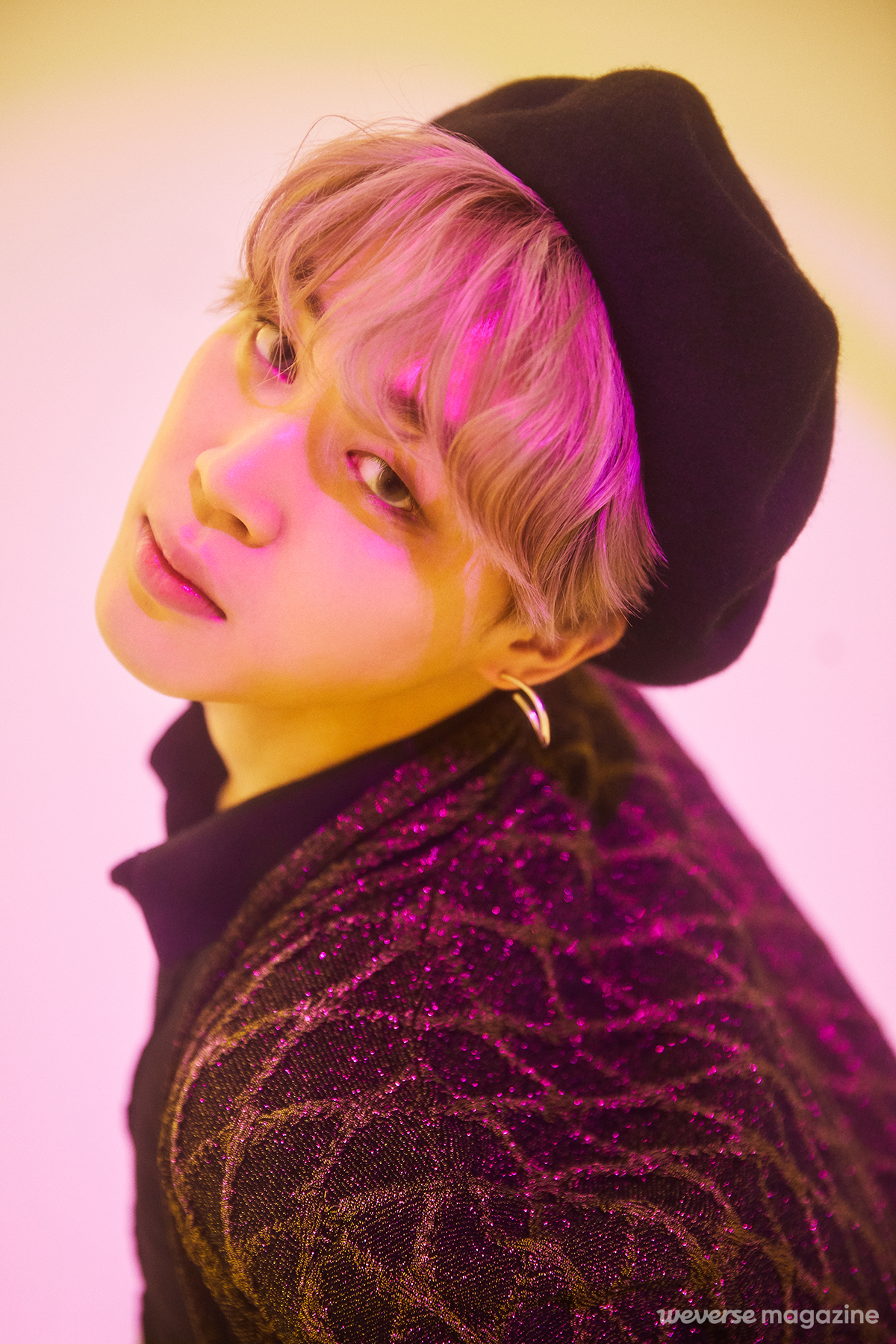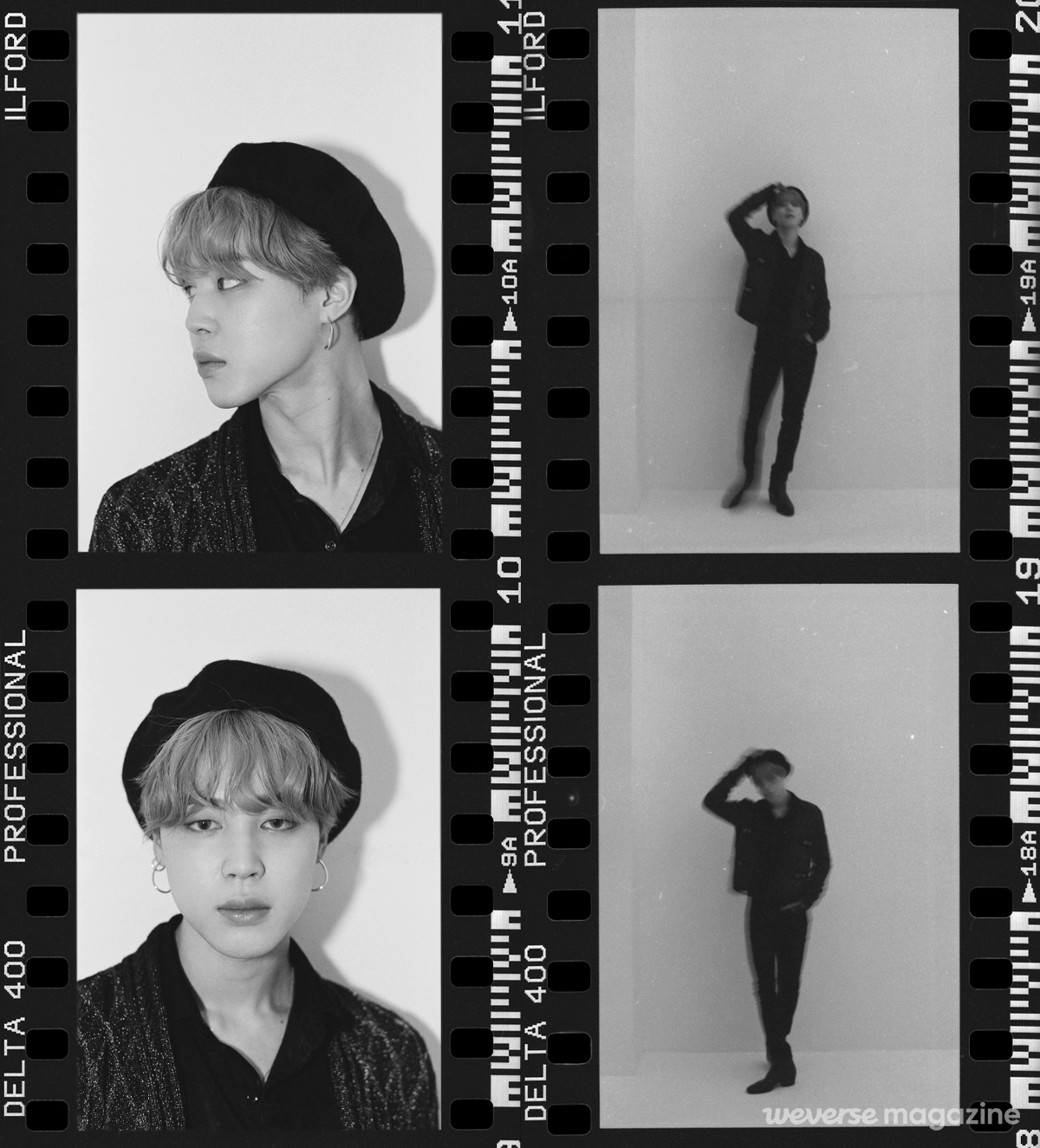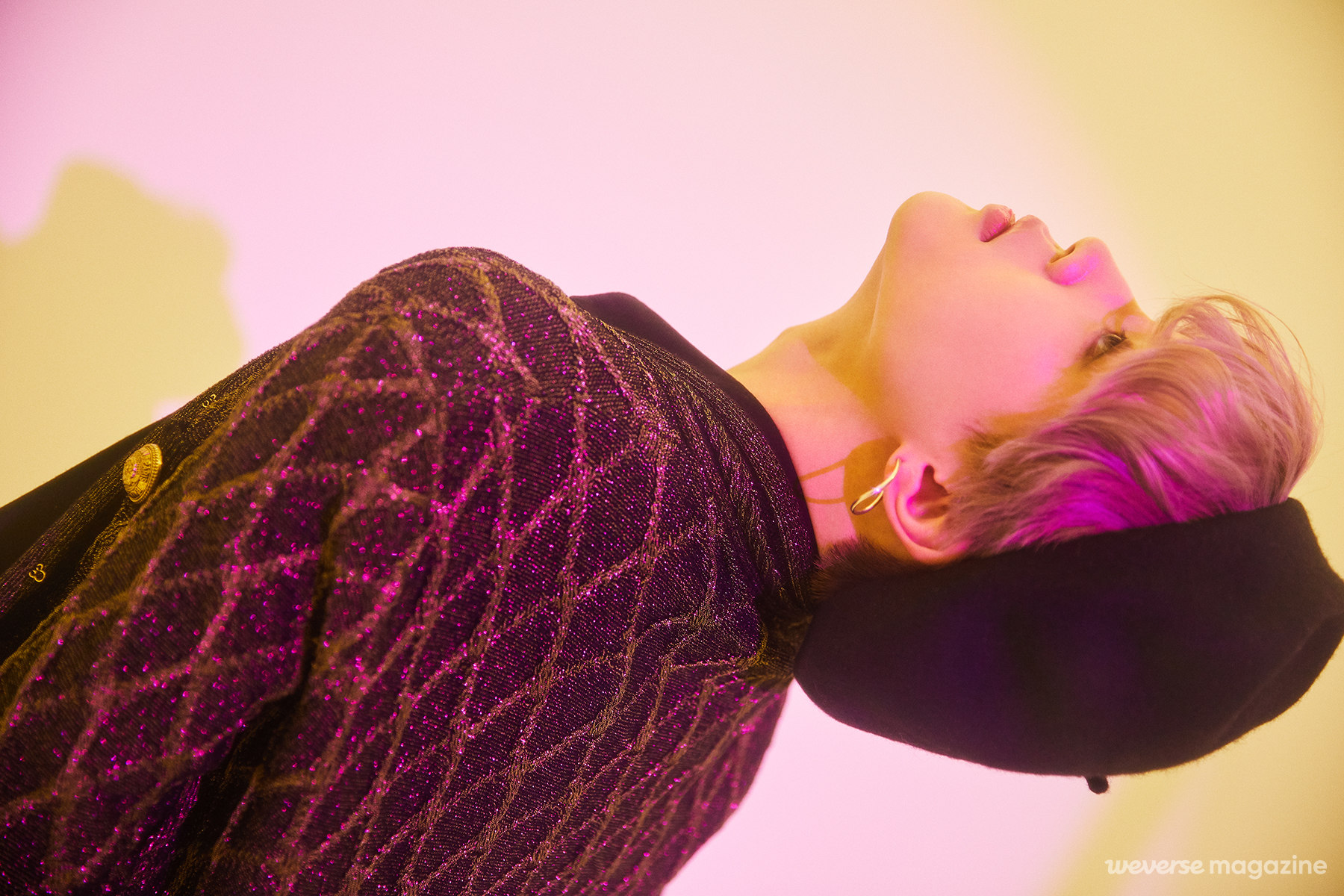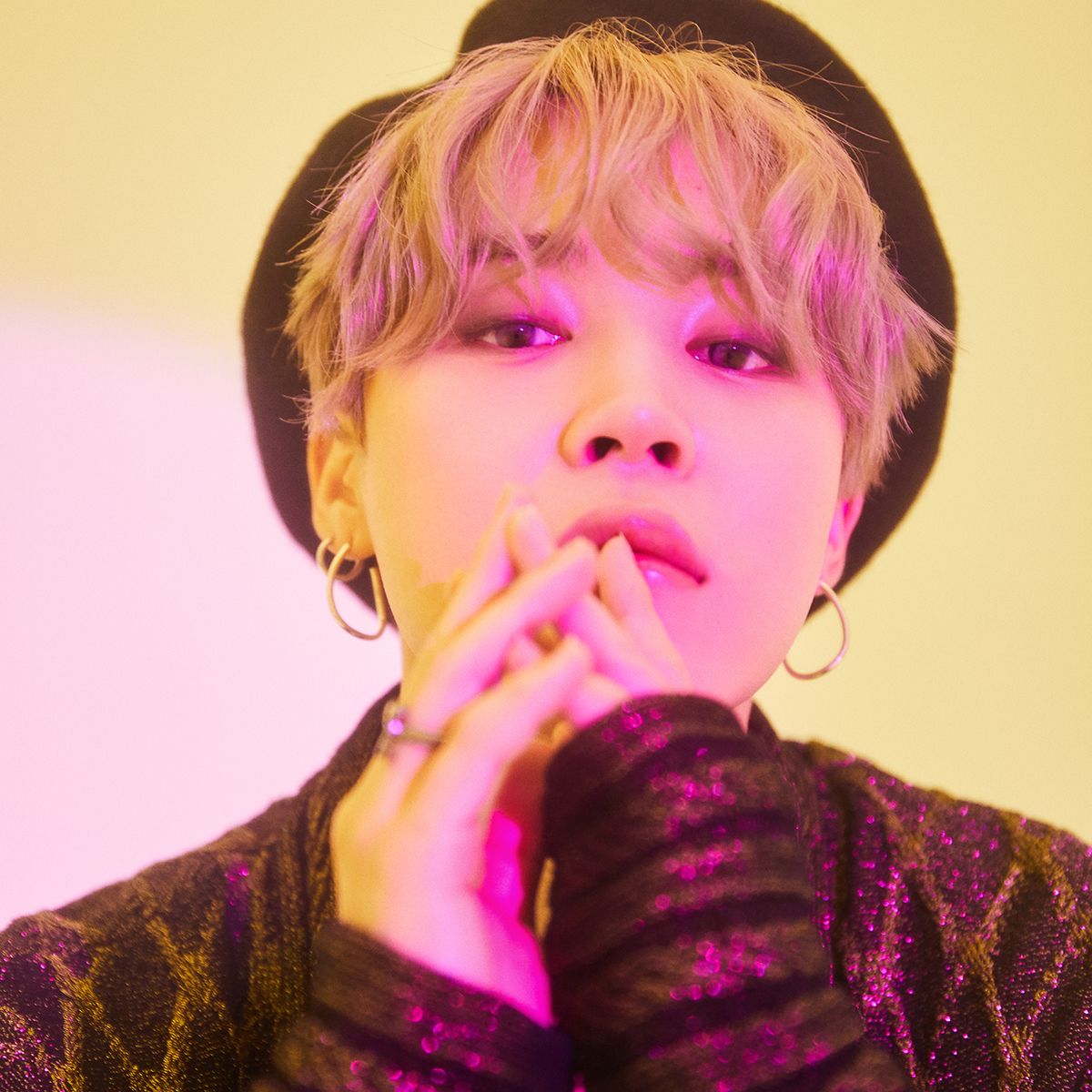
On one V-LIVE session back in October, you wore the clothes that you had planned to wear at the airport if you were to go on tour.
Jimin: I hadn’t really noticed, but I think I’ve finally come to terms with the reality of our present situation.
By “situation,” you mean how it’s difficult to meet your fans in person?
Jimin: Yes. If we had to go on stage in this situation, or if we had to perform our songs, I’m not sure how we would go about accomplishing that. At the same time, It felt like something that was closed up and blocked was opened up again. There isn’t the kind of excitement we got from tour season, though, so it’s easy to feel worn out. But, just like when we’re making new songs, I try to do whatever I can.
BE feels like it’s all about taking care of your feelings and the process of moving forward.
Jimin: I had the role of listening to what the members wanted to include in the album, but it’s more a record of the present than it is about our individual feelings. We talked openly about how we’re having a hard time and how we’re trying our best to get over things, and that became the album.
As the project manager for BE, how did you go about gathering and organizing all the members’ ideas?
Jimin: I became the project manager because Yoongi recommended I do it, but I didn’t think I had to lead anything along, more just make sure the other members could do their work quickly and easily. Usually that meant asking about their opinions, or passing opinions back and forth with our company. So I would collect ideas, organize them, say, “These are some of the ideas we got back. What do you think?”—ask them again, if they said okay, pass it on to the company, and if they made a song, I sent that over, too.
Jimin: I would mention them by name in our group chat, and that got them to reply. (laughs) Any time I said someone or other didn’t submit their idea yet, all the others would chime in with, “Hurry up, guys!” and then they’d give it to me.
Sounds like it’s great for one of the members to be project manager. (laughs) How did you accommodate all the different ideas?
Jimin: When we first started, we sat down for about an hour and said: If you feel downtrodden, just make a song about feeling desperate; if you want to give others hope, go ahead and write a hopeful song. Let’s find the topic and work from there. And since there’s seven of us, and the album’s going to be about current events, let’s put in one skit to make seven songs; and let’s not put in any solo songs. Let’s make something that we can all work on together.
That approach must have been different from the way you worked on your other recent albums.
Jimin: We never said anything like, somebody will make this song and someone else will make that song. We would just take a song and say, Who wants to do this? Who wants to do that? I became more ambitious, and wanted the other members to recognize the work I was doing. And because it was so fun working together, any time I made something, I wanted to play it for them right away. I also loved when they gave me compliments, so that added to the fun. When the songs are eventually finished, we hoped the fans would be able to pick up on all those emotions exactly as we felt them, although there are some songs that didn’t make the cut. (laughs) It was really fun.
Jimin: A little while ago, I learned something new about myself: I’m the kind of person who likes to be loved. Looking back, I realized I do what I do not just for the work itself, but to be loved by my friends, family, the group, and fans. It’s been really hard to hold onto those connections, but I felt a fullness once I was sure of that love and kept those relationships close. It was like getting something of my own.
Rather than simply being loved, is it actually a satisfaction arising from the effort involved and the deep sense of trust it builds?
Jimin: I used to think more frequently about what I was getting from them than what I was doing for everyone else. Even if I don’t strictly owe our fans or group members anything in return, I feel a deep and sincere appreciation for all the things they do for me. I also saw some people for who they really are, some people who don’t really care about me. Rather than pushing those people away, I learned how to react less emotionally to them. Likewise, I was able to be more emotionally honest with people who are very considerate toward me.
It’s become difficult to express those kinds of feelings to fans these days. The only choice, really, is to talk to them through your songs. What is your message this time?
Jimin: There’s a message in every album and music video we make; but you don’t have to understand the message, I just hope you enjoy listening and watching. That’s the first thing. I hope you really like the songs and videos I created while working to not become complacent, so I took great care and practiced a lot to present something perfect to you.
On that note, I think your singing and dancing are changing quite a bit. Your performances in “Black Swan” and “Dynamite” are completely different, but perhaps because of your changed body silhouette, the feel of your dance has become more consistent. As a dancer, what is it you want to express?
Jimin: I just hope my emotions come across. I just want the emotions I put into my dancing, actions, and singing to be felt. So I got a lot of feedback, asked around, did some research and found that for each emotion you might express on stage, there’s a body most appropriate for the job. We all have different body types. In order to get the body that can best express my emotions at my age, I went on a strict diet, but I don’t stick to it nearly as intensely as I used to. (laughs)
Jimin: I look how I want to look when I’m around 58 kg, so I went on a diet and lost 5 kg. That’s when I found the look I wanted to present to everyone. I can’t be objective about myself, but there was a certain vibe that I wanted. In the past I tried really hard to be no-frills, and by focusing less on trying something new and more on avoiding mistakes, I prevented myself from advancing any further. But in “Dynamite,” I tried out expressions I’d never tried before. I wanted people to be able to tell that I was really concentrating on this when they watched the video, so for this song, I tried to be sentimental and—how should I put this—I even tried to look suave (laughs) and funny, too . I ended up focusing on painting a single picture rather than on each of the individual elements.
And what is it you wanted to show off?
Jimin: We haven’t been able to put on a real show during COVID-19. I wanted to show that we didn’t waste all that time but rather have kept going through it all, that we keep working hard. But portraying “working hard” through dance would look really tiring, so I smiled and danced throughout filming “Dynamite.”
How was that possible? It couldn’t have been easy to keep the whole team motivated.
Jimin: With the spread of COVID-19, it took us a while to really believe our rise to the top of the Billboard Hot 100. When we checked our phones and it said we got first place we were amazed, but it was hard to believe, although we were all crying. (laughs) But when COVID-19 first hit, we said, “Ah, it’ll pass quickly and we’ll be right back on tour.” The reason was that we had said, even if it gets tough, let’s give it our all for the next year. Give it our all and collapse.. That was the plan, but we were really disappointed. What was worse was, when I heard it would be hard to have any performances this year, my head … it sort of went blank. My mind was empty. We couldn’t just take a break either. Other people had it really hard but we could keep working. I didn’t know whether we should be happy or sad about it. There were no answers for anything. It was really tough.
Jimin: If an interviewer or anyone else asked me what my goal was, I told them my goal is to perform with the members for a long time, and that is probably my biggest goal; but I was really saying that to the group: I want to be with you guys for a really long time. I think we conveyed that feeling well to one another. I seriously worried a lot that the group would get exhausted. But they’d be laughing with one another, cheering each other up. We had a lot more time to chat together, so whatever was going on, we could always talk about it over a drink at our home and work it out.
What makes you take your work so seriously?
Jimin: I really want to love this job inside and out. If we just look at work as work, all we’ll be after is money, but I never once thought that our group’s dynamic, or the relationship we have with our fans, was based on that. But I think if you’re exhausted mentally and physically, the work becomes a chore, and then your relationships will inevitably suffer. That’s what I was afraid of.
The song “Dis-ease” is about how each member feels about working. How do you feel about your work?
Jimin: I don’t consider my main profession, performing and singing, “going to work.”. But when I’m doing something else with the camera right in front of me,that feels like “work.” Singing and performing for our fans isn’t work—it’s something I really, really want to do.
Jimin: The bridge. I was recording with Pdogg and there was one part that didn’t have a melody, so—should I call it improv?—I was just singing something without thinking about it, and then he asked me to sing that again. So I asked if he was sure, and then he asked me to write the melody, so I ended up writing it.
Some of the other songs on BE have something like that too, but “Dis-ease” somehow feels particularly like old school Korean hip hop.
Jimin: I thought so too. I thought of 20 years ago when I sang it. The majority of the song was written by j-hope, so that might just be my thinking (laughs) but I sang it when there was a question mark on who would sing the vocals. I was really doing whatever I wanted, so I sort of had to be restrained (laughs) but it was fun.
Was there any place the vocals changed while recording? There are a lot of parts on BE where you use almost a normal speaking voice.
Jimin: I usually already have the big picture set in my mind when I sing, but this time it wasn’t like that. “Life Goes On,” especially—that song’s not about me, but I couldn’t help but empathize with it, so right from the beginning I performed it without having to think about how my voice should sound. I wasn’t thinking about some particular emotion of mine I wanted to express to you. I just recorded exactly the feelings I had as I sang.
There’s a song titled, “Telepathy.” When you streamed yourselves in production on YouTube, the group mentioned the idea of telepathy which made me think you were sending the song directly to your fans. If you could talk to them through telepathy, what would you say?
Jimin: People have kind hearts, and I just hope they don’t let that go. You asked about telepathy, but I think we really do have a telepathic connection with our fans. It’s not crystal clear or anything, but I think if we’re sincere then they can feel it somehow. I think that’s why our fans support us and are always by our side.
Jimin: One thing I’m always curious about, about our fans, is what’s the hardest thing in their lives. What each of them is struggling with, what’s making them happy—I’m really curious to know. We face our own difficulties as well, so I always wonder if there’s someone in each of our fans’ lives to ask them if they’re doing okay. I hope things get better soon, that people can keep holding on, and that the adults will follow all the rules. Kids don’t have a lot of options right now to do the things they want to do. I imagine a lot of kids see this as something that’s being forced upon them by adults, so I hope the grown-ups will properly explain the situation to the kids so they can help each other too, to end the pandemic.
The news is saying that they’ve made a COVID-19 vaccine, so you might be able to meet your fans sooner than later. What are you going to say to them when you finally see them again?
Jimin: I don’t think we’ll say anything. I think we’ll just look at each other for a very long time. And if I’m able to say anything, I’ll probably say, “You made it. Now let’s get back to having a good time.”
Unauthorized reproduction and distribution prohibited.
